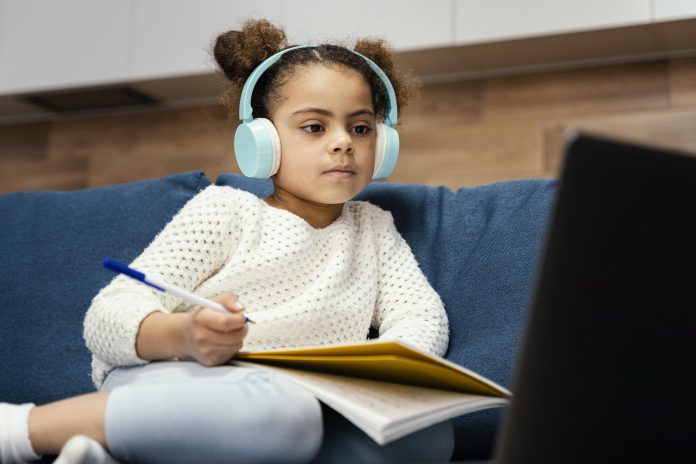With the unpredictable epidemic situation, online learning does not seem to be a temporary solution anymore, as being proactive is a must-have characteristic of any parent in the modern world, so parents need to prepare for it, physically and mentally for long-term online learning at any time. Here are 7 must-dos to power up children when learning at home.
7 must-dos to power up children when learning at home
Create a comfortable study space
Some online learning tips for parents to help improve your child’s studying space:
- Encourage your child to clean up the study space to make it neat, orderly, and airy.
- Arrange a compact desk with items only for studying, and a comfortable chair to help children focus better when studying online.
- Make sure the computer your child uses to learn is working properly (also making sure the Internet connection is stable).


- Adjust the child’s spitting distance from the screen (with the child’s head to the screen roughly an arm’s length) and the screen height (with the child’s eyes level at the top of the screen).
- Make sure the room is well-lit.
- Pay attention to your child’s clothes.
- Avoid participating in video calls while in the bedroom.
Let’s build a healthy habit together
Parents should plan a specific time of the day with their children to study online. This helps family members actively eliminate distractions such as TV, loud music, and toys during learning from home time. Parents also need to allocate study time and leisure time appropriately.
To dispel the feeling of boredom and dullness, during recess or leisure time, parents can exercise with their children, or exercise combined with lessons such as practicing yoga while counting numbers, cooking with children, etc. Be creative!
Actively use technology to protect children
One of the most practical online learning tips for students is – making sure they are safe online first!
Parents should regularly check children’s device to ensure that it is running the most up-to-date software and anti-virus program, has turned on privacy settings, and frequently remind them of keeping information confidential at all times, especially before providing information to any third party software, programs, and especially strangers.
Another tip is to keep the webcam covered when not in use. To help maintain a positive online learning and play experience, you should use the tools available to you to set up parental controls on your child’s device to filter harmful content, limit the use of device use, or some other features for children such as no in-app purchases.
You can refer to a few ways below:
- How to set up parental controls on Macbook
- How to block porn sites on Google Chrome
- How to block porn sites on Safari
- Set up parental controls for Microsoft Edge
- Set up parental controls for Youtube


However, with the spread of harmful content (especially pornography) by the second, by the minute, and by creeping into websites that have nothing to do with pornography, these built-in features of devices and platforms are not enough.
To ensure your child’s online environment is safe and healthier, you should consider using an additional online content filtering tool – considered by many parents as one of the best free parental control software to hide 15 types of harmful content on the Internet, including:
- Pornography
- Horrifying content like gore, accidents, ghosts, violence, murder, terrorism, etc
- Content about stimulants, addictive substances such as alcohol, beer, marijuana, drugs, etc
- Content with aggressive elements, hurting others like Hate speech
This free porn blocker extension can help to minimize your child’s access to harmful content, ensuring a healthy online environment for your child but at the same time, not invading their privacy rights.
You may also find this helpful:
Encourage healthy online habits
CyberPurify encourages parents to help their children get to know their classmates and teachers by setting aside time for their children to chat daily with a friend or group of friends. When your child is having trouble learning online, encourage them to reach out to friends and teachers for support.
In order to help children get acquainted and connect with friends more effectively, you need to actively guide your child to develop Digital Intelligence on the Internet – as the skills to behave and communicate in the virtual world are as important as the real world, especially when children rely on the Internet to learn, play and connect during the pandemic.


One of the important digital skills is to educate your child on how to communicate and express his thoughts to others via the Internet as effectively as when he or she communicates face-to-face with friends (even their friends may have different views.)
Don’t forget to listen to them
Don’t take anything your child shares lightly, especially when he or she expresses fear, insecurity, or anxiety about learning online. Parents need to listen to children seriously and talk to them openly about the problems they are having. Don’t hide, but acknowledge the changes your children may go through and encourage them.
Don’t forget to create a friendly and open conversation environment where your child can share anything with you without fear of being scolded or judged, such as seeing a nude/sexual image online, or a stranger trying to approach them online, or a friend sends you a link containing content that makes them uncomfortable.


Keep an eye out for unusual psychological signs
This is one of the most underestimated ways to help children learn online. You should be on the lookout for signs of upset, fear, or discomfort in children as these may be related to their online activity such as your children being bullied online or having someone force them to send nudity, for example.
That’s why parents need to make sure to stay in touch with their child’s teacher in order to get in touch with the teacher promptly when you or your child are facing challenges with online learning such as school assignments, technological challenges, academic pressure, or more serious issues like online sexual harassment, cyberbullying, etc.


Continually educate your children about the dangers of the Internet
Talking is considered one of the best ways for children to be self-aware and proactive to stay away from dangers on the Internet. This is about both a foundation and a catalyst for building meaningful and close relationships between parents and children. Also, it plays an important role in how to study online at home effectively.
That’s why you need to have an honest conversation with your child about the risks on the Internet that they may face, such as:
- Online sexual attackers: who and how they target the victims.
- Inappropriate online content such as pornographic, adult images/videos.
- Content that haunts and scares children like gore, accidents, murder, etc.
- Online scams, phishing, etc.
- Risky behaviors that children and teens usually commit: sexting, online bullying, sharing too much on social media, etc.
You may also find this helpful:















